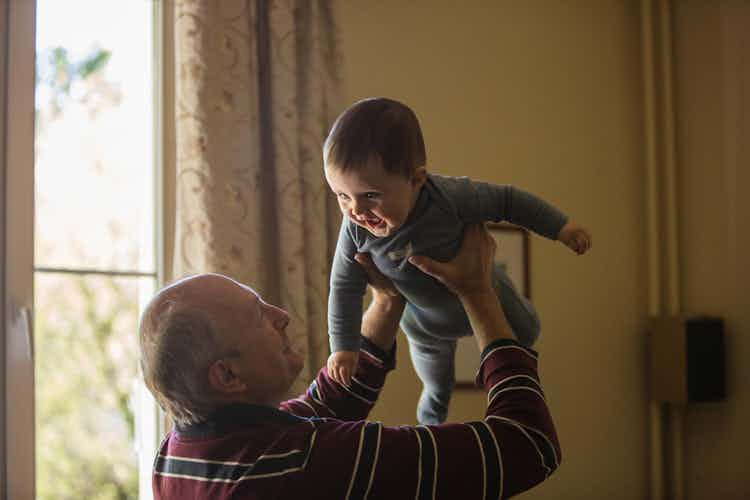While knowing what savings accounts you can open to make the most of a pension is vital, you may also want to know how to invest wisely for your family. More specifically, if you are a grandparent, you may want to put money away for your grandchildren to provide them with a lump sum when they turn 18. With the rising costs of university tuition and increasing house prices, lump sums can be helpful to young adults.
But what are the best investments a grandparent can make on behalf of their grandchild? And what are the restrictions surrounding them? Understandably, the restrictions surrounding making investments for children are quite strict. Without them, they would be prone to abuse by those looking to make such investments for individual gain.
Here, we look to answer those questions so that you can make the most suitable investment for you and your grandchildren. As with all investments, some will be better suited to your needs and requirements than others. You will need to consider your specific circumstances, along with your grandchild's. Doing so ensures you are making the best investment possible.
Save for your grandchildren's future by checking out the UK's leading Junior ISA providers now.
What investments can I make for my grandchildren?
Junior ISA
A Junior ISA is a tax-free account available to those under 18. Grandparents and parents can save up to £9,000 in the 2020/21 tax year for the child in question. Note that only a child's parent or legal guardian can open a Junior ISA, but as a grandparent, you can then set up a standing order to make regular payments into it. Junior ISAs, or JISAs, work similarly to a regular ISA and mean that children can earn interest on the savings tax-free. The child can access the cash at 18, though they can also start managing the account themselves at 16.
Other benefits to its tax-free status include the flexibility to invest in stocks and shares as well as simply set up a cash ISA account. The bonus to either is that all gains are sheltered from paying tax when those returns are realised.
However, there are disadvantages to a Junior ISA. Firstly, the amount that you can invest may be too low for you. You may have liked to invest more than to benefit from the tax-free status of this investment. Additionally, if you put money in a cash JISA, you may be disappointed with the interest rates offered. As a result, despite being tax-free, you may earn a better return overall on a regular savings account or other investments.
Premium Bonds
Premium Bonds are another investment product open to adults and children alike. For that reason, they are sometimes purchased by grandparents wishing to make the most of the benefits that they hold.
The biggest draw to Premium Bonds is perhaps the £1million cash prize that is available to bondholders every month. However, if you are not lucky enough to win that prize, other amounts are awarded to lucky account holders starting at £25. For every £1 that you save, you have an entry to the draw. Bondholders can invest £50,000 each year and accounts are easy to open - either through the NS&I website or even the Post Office.
There is one significant disadvantage to Premium Bonds that may well put many potential investors off. There is an incredibly low chance of winning a cash prize in the draw each month. Relatively few investors have ever won anything at all, let alone the smallest £25 prize. In fact, what is also a big drawback to Premium Bonds is that you do not earn interest on what you have saved. The result is that if you do not win one of the larger prizes, your grandchild’s account won’t grow.
Savings Accounts
Savings accounts, when in the name of a person under 18, actually hold many advantages from which those over 18 do not benefit. Children, because they are not earning a salary, often do not pay tax as they do not earn enough money in any given tax year.
It is not widely understood that children actually have the same tax allowance as adults. With regards to savings, this means that any interest earned on savings accounts is always going to be tax-free - much like a JISA. As a result, grandparents can invest cash in savings accounts that have a high-interest rate. There will not be any tax payments incurred on the interest earned.
For that reason, there is a high degree of flexibility when it comes to opening a savings account for your grandchildren. You can choose to open one with a lump sum and let it earn interest year after year until your grandchild reaches 18. Or, you can open a regular savings account so that you slowly pay into your grandchild’s savings when you can afford to. You can shop around for the account with the best interest you can find.
Disadvantages are any restrictions that some savings accounts place through strict criteria. Some will have a set limit on how much you can save. Others may have a market-leading interest rate at one moment in time, only to be bettered a couple of months after opening by a competitor.
Investing for your grandchildren
Investing for your grandchild is what every grandparent will want to do. For some, it is easier than others. Either way, when you do go to make investments for them, you want them to be the right ones. Ensure that you pick your final choice bearing in mind both your and their individual situation.
We spoke to Prakash Chandramohan, Strategy Director at TISA, who told Pension Times: “Gifting money to grandchildren has the potential of being transformative to a person’s life. It allows the grandchild to see for themselves the fruits of putting aside money for the future. It can mean a person avoiding having to rely on debt when they become young adults.
"One of the more underrated advantages is that it allows the grandchild to benefit from compound returns over a long period of time – allowing the grandchild to benefit from returns on reinvested interest or dividends earned. It is important though that grandparents try their best to preserve their financial gift from the eroding impacts of inflation. Interest rates on cash are very low. Ensuring the gift is sensibly invested, for instance in a Junior Stocks & Shares ISA, can give a better chance of returns keeping up or outstripping the rate of inflation over the long term.”








